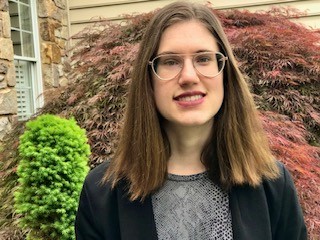
OHIO student selected for prestigious Appalachian Regional Commission Fellowship

by Noah Wright | June 3, 2021
Paige Miller, an Ohio University senior working toward a Bachelor’s of Specialized Studies program with a focus in journalism and history, has been selected as the Appalachian Teaching Fellow for the prestigious Appalachian Regional Commission (ARC) 2021 class of fellowships. Miller came across the opportunity through coursework she was doing in the Ohio University College of Health and Science Professions (CHSP).

Paige Miller’s work with the ARC this summer will be carried out in up to 13 different states and 420 different counties of the Appalachian landscape.
The ARC’s teaching fellowship selects only one student each year to carry out research on issues facing Appalachia in the hopes of properly combating them.
Miller, who was raised in Philadelphia, has not always been aware of the struggles faced by Appalachians or the opportunities to work towards remedying them. However; that changed when she enrolled in Intro to Appalachian Studies, a CHSP course on the cultural, historical and modern issues facing Appalachia. Intro to Appalachian Studies is taught by Dr. Tiffany Arnold, a CHSP professor with a focus in Appalachian healthcare and Appalachian youth.
“In Intro to Appalachian Studies we had a service-learning project with Little Cities of Black Diamonds, which is a cultural non-profit that hopes to engage younger generations in an understanding of coal mining’s history and heritage,” Miller said.
For this project, teams of students carried out research and presented it at the Appalachian Teaching Project Conference, which is run by ARC. It was this work that peaked Miller’s interest in working in Appalachian Communities.
“The fellowship was offered to students who completed the ARC conference in the past two years. So, I came into it through the (Little Cities of Black Diamonds) project,” she said.
ARC’s fellows work in the research and evaluation division. This entails carrying out follow-ups with ARC grant recipients in the region. Fellows meet with grant recipients, conduct interviews, monitor the results of ARC grants and write case studies.
“These case studies are in accordance with the Government Performance and Results Act that ensures federal agencies are (monitoring) the results of their projects and reporting back to Congress to ensure funding in the future. It also helps stakeholders understand what ARC does and why they should support it,” Miller said.
The work Miller is doing this summer ensures that businesses and organizations in Appalachia can continue to receive the grants and funding ARC provides. Miller has always been devoted to advocacy, and now she gets the chance to bring her passion for advocacy to issues facing Appalachia.
“I became familiar with the struggles of healthcare in Appalachia (after discovering) there is only one hospital in the county. (I grew up) outside Philadelphia where there are countless hospitals, So, that aspect and understanding issues like the opioid crisis really interested me,” Miller said. It was this interest in Appalachian-specific issues that drove her to the OHIO HSP coursework which eventually led to this position with ARC.
This summer, Miller’s work with the ARC will be carried out in up to 13 different states and 420 different counties of the Appalachian landscape.
“It’s a broader focus than just Athens, and I think that’s so interesting, and I’m excited to hear about other experiences and see how the Appalachian identity and heritage differs from state to state,” she said.
Miller’s work with ARC began on May 10 and will run through the end of July. The work is still being carried out in a COVID safe, remote environment, but Miller said it hasn’t taken away from the enjoyment of her work at all.
Miller says she hopes to go on to law school following her time at Ohio University, and the work she’s doing this summer will give her the valuable insight into public policy that she plans to apply to her career path moving forward.
